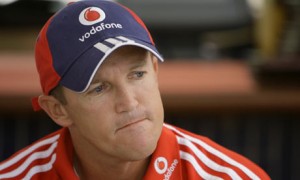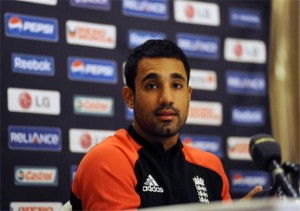
A gradual but inevitable descent into cricket-based loathing and bile.
One Day Cricket: why we ought to care about the recent results, but not worry about them.
By Anthony K
In July, as England approached the decisive encounter of their home series with Sri Lanka, this correspondent suggested that England’s ability to win at home – on helpful pitches – had never really been a problem and that “with ten games against world champions India coming up, we will see where England really stand.” The lack of a clear vision was bemoaned and questions were asked as to whether England were prepared to do what was necessary to become a force in the 50-over game and to offer a serious challenge in the 2015 World Cup after 20 years of humiliation. Preparation of fewer ‘English’ pitches for home games was seen as a key part of the progression.
Nobody really expected convincing back-to-back series wins against India, so on the face of it, a home win and an away defeat were par for the course. What was disturbing was the dismal spectacle of an England side being thrashed in four of five matches and crumbling in the field in the other. Such levels of ineptitude were meant to be a thing of the past under the current management. England’s set up was too professional for the one day side to have a website name-inspiring debacle of Jamaican proportions.
So, the rather unsurprising verdict is that England stand where they have generally stood for the last twenty years in one day terms: more than a match for anyone at home, but cannon fodder for the better sides when those feet cannot walk upon England’s green and pleasant pitches. Andy Flower struck a typically honest pose when asked to review the latest in a long line of embarrassments for England’s travelling one day band, pledging to begin his review with a look at his own part in proceedings. This is an admirable trait and England are lucky to have such a man leading their effort. The other part of the management, Alastair Cook, must and surely will reflect on his own efforts too. England looked stereotyped with bat and ball and there has been some pretty unedifying behaviour in defeat. Cook must be assertive enough to address these failings or he will not be the leader England need (which is another issue, in this year of six different captains).
Many will feel that England return home with more questions than answers, but Flower will doubtless make a cool assessment of where England really are. If one-day international cricket moves in four year cycles, from World Cup to World Cup, then we are only at the beginning of the process by which England hope to be serious contenders in 2015. Players will come and go; some of the younger ones perhaps to come back again as they mature. It is really only by the Ashes tour of 2013-4 that England will need to have become a match for their hosts, who remain the number one ranked side by a considerable distance and will be the principal hosts in 2015.
This correspondent sees the core of a formidable side emerging, which can stay together and grow in the time required. Form and fitness can make any prediction seem rash, but it is not difficult to see Cook, Trott, Morgan, Broad, Bresnan, Swann and Finn forming that core. Each of those players has work to do before becoming truly world-class performers, Swann arguably aside, but each of them has shown that appetite in the Test side and there is no reason to think they cannot do so again. Beyond that, perhaps three batting and one bowling spot are up for grabs. Jimmy Anderson is the obvious choice to complete the bowling line-up and, if he can combine Test and one-day duties, he would be this correspondent’s choice, but the likes of Chris Woakes and Jade Dernbach, whose career to date has been the very embodiment of the curate’s egg, might provide him with strong challenges. If the choice is for a second spinning option, then Samit Patel and Steve Borthwick are the current main contenders. There is plenty of time for this contest to be resolved. Each man, rather like Dernbach, has shown enough to suggest that he could make it (curiously, Patel’s best work has been with the bat of late), but the jury must remain out until they have had enough games for a definitive assessment to be made.

Steven Finn was head and shoulders above the rest of the team in India (literally and metaphorically).
Four batting failures out of five in India suggest strongly that it is here that England need to focus their attention. Serious doubts remain over the ability of Craig Kieswetter and Ravi Bopara to make it as international players. The former ought to have prospered in India, where conditions should have enabled him to hit through the line with greater freedom than on the seaming pitches of home, but he continues to display a worrying lack of composure which stifles his undoubted gifts. If he can overcome this, he is the answer to England’s opening dilemma and lack of power hitters. If not, they have a serious problem. Do they convert one of their middle order, such as Pietersen or Bell, themselves both unconvincing in this format: Bell throughout his career and Pietersen in the last couple of years? Sadly, Bopara does not look to have the fortitude or resourcefulness for the role England are asking him to play and must be considered to be in the last chance saloon. There is too much talent waiting in the wings to carry non-performers and surely the likes of Stokes (who should only be picked when fit to bowl), Bairstow, Taylor, Hales, Buttler and Root, amongst others, will make increasingly strong cases for greater involvement over the coming years.
All in all, it is with qualified optimism that England fans can look forward. With six or seven actual or potential top-class performers already established in the side and a seeming abundance of young talent on the fringes, there could be much brighter times ahead. Were Ian Bell to effect the kind of transformation in his one day form that he has managed in Tests, and if doubts over Kevin Pietersen’s commitment to the cause could be resolved positively, this correspondent would be happier still. With international T20 serving very little purpose beyond assessing prospects for more serious forms of the game and the welter of 50 over cricket to be played over the coming years, there is ample scope for all these questions to be answered and for England to treat ODIs with the same seriousness as the great Australian sides of the recent past. It is perhaps fanciful to expect the same level of success, but it should not be because of a failure to respect the format.



No Comments
Post a Comment